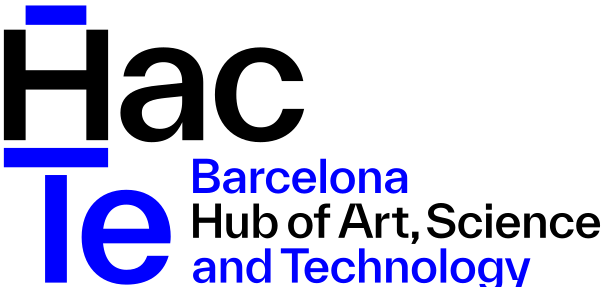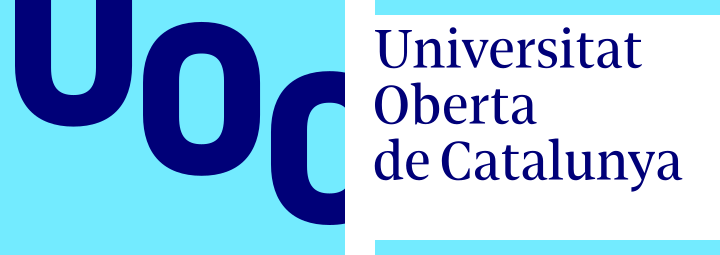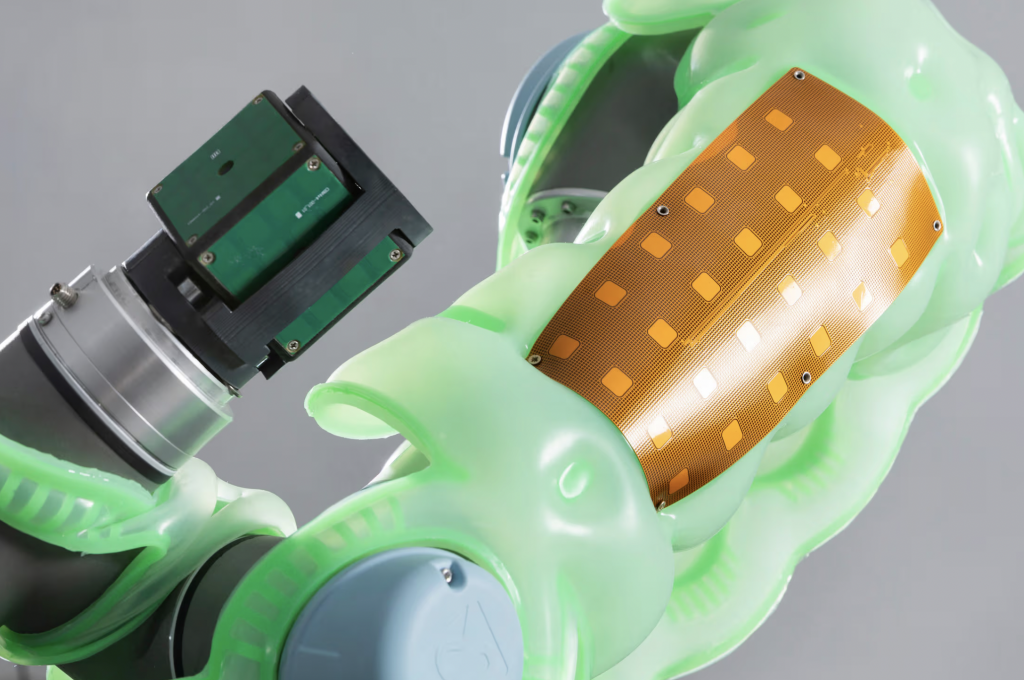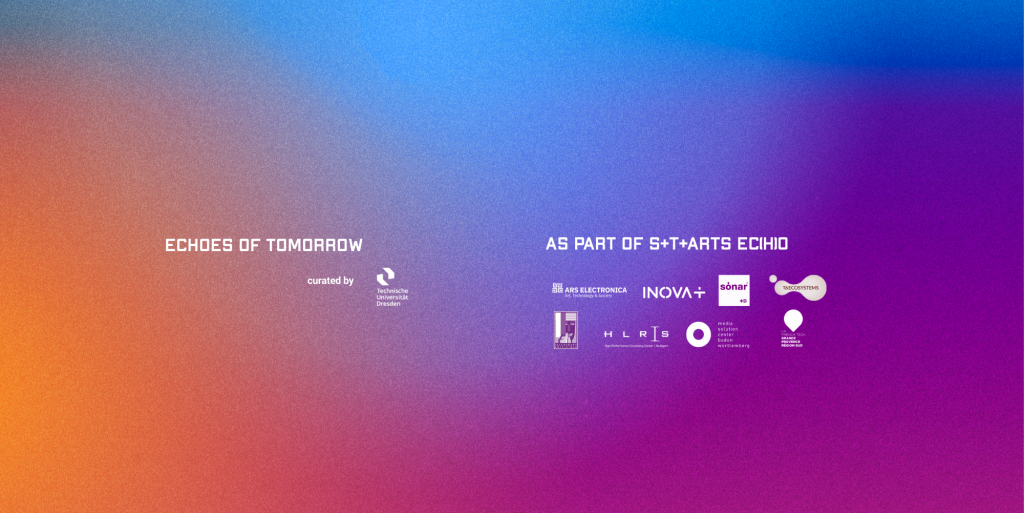Universitat Oberta de Catalunya (UOC), Barcelona
A S+T+ARTS Symposium to reflect on impact and shape the future
Preliminarily Event
Photosynthesis at the Interface of Arts, Sciences and Society
Date: 28 October 2024
Time: 17:30-20:00
Place: Hivernacle Parc de la Ciutadella (Passeig Picasso 7, Barcelona)
Free access prior registration through this link: https://forms.gle/VgQcGmikTZJSaPUp7
More info: https://hactebcn.org/activitats/localevent-icfo/
A debate to explore the dynamic intersection between science and the arts, focusing on photosynthesis for societal impact. It will bring together scientists and artists to explore both scientific and creative approaches to understanding and harnessing this vital biological process, from the microscopic mechanisms of photosynthesis to large-scale applications such as regenerative life-support systems for human space exploration.
Participants: Nicoletta Liguori (ICFO), Raoul Frese (Vrije Universiteit Amsterdam), Nicolas Maigret (Disnovation.org), Francesc Gòdia (UAB, Melissa Pilot Plant) and Paula Bruna (visual artist and environmentalist).
Free access prior registration through this link: https://forms.gle/VgQcGmikTZJSaPUp7
More info: https://hactebcn.org/activitats/localevent-icfo/
In the framework of S+T+ARTS in the City.
SYMPOSIUM PROGRAMME
Date: 29-30 October 2024
Place: UOC, Universitat Oberta de Catalunya. U Building. c/ del Perú, 52. 08018 Barcelona
DOWNLOAD THE PROGRAMME
Tuesday, 29 October 2024
09:30-10:00 | Front desk U Building
Registration
10:00-10:30 | U0.2
Welcome words
10:30-11:30 | U0.2
Opening Talk: The Art-Science Complex: Observations from the Field
Keynote speaker: Chris Salter, Zurich University of the Arts (ZHdK)
Respondent: Veronika Liebl, Ars Electronica
The Art-Science Complex: Observations from the Field
This talk examines the “art science complex:” a certain set of genealogical and epistemological assumptions about the histories, theories, methods and practices involved in the long gestation attempts to bring together artists and scientists to enable new forms of knowledge production. Despite radically different contextual, socio-technical-political and aesthetic motivations and institutional setups, a certain narrative continues to operate that seeks to smooth out the frictions in what is in reality a much more messy, conflict-prone and turbulent arena. In effect, in order to understand what lies beneath the art science rhetoric, I aim to examine these inherent frictions within socio-technical networks linking artists, scientists, research and innovation agendas. Such frictions include the problematic of “epistemic cultures” in how knowledge itself is constituted and contested in the arts as compared to the sciences, the much ballyhooed (but rarely criticized) concept of interdisciplinarity and the continued belief in the unity of the sciences (from the arts) and the unity of the arts (from the natural/human/social sciences). Going below the surface of these socio-technical networks thus reveals larger issues of dynamics, disruption and change in the sociology of innovation as well as the ongoing tension in art-science collaborations between the production of durable, representational and normative knowledge versus the deployment of aesthetic strategies inherited from the genealogies of the avant-garde such as ambiguity, confusion, agonism and defamiliarization.
11:30-12:00 | U0.1
[Open Space] Coffee break
12:00-13:30 | U0.2
I Panel Discussion: Towards Hybrid Research Scenarios
Lúa Coderch, BAU, Centre Universitari d’Arts i Disseny de Barcelona
Marta Royo Llonch, SHOOK Studio / ICM-CSIC
Gleaning the art and science collaboration field: a data ecology prototype
Based on the logic offered by Agnès Varda’s film “The Gleaners and I” (2020), researchers from BAU Centre Universitari d’Arts i Disseny and the Institut de Ciències del Mar (CSIC), are developing a project where artists and scientists work from a data ecology paradigm. The metaphor of going back through a field that has already fulfilled a first productive function can be deployed, collecting what was initially dismissed or overlooked.
Authors: Vanessa Balagué¹, Elisabetta Broglio¹, David Casas Layola¹, Lúa Coderch², Mariona Moncunill-Piñas², María Fernanda Moscoso², Marta Royo-Llonch³, Valentí Sallarès¹, Carine Simon¹, María Vicioso¹. ICM (1), BAU (2), SHOOK Studio (3)
Derek Curry and Jennifer Gradecki, Northeastern University
From Algorithms to Allegories: Leveraging Scientific and Artistic Epistemologies to Combat Digital Disinformation
Epic Sock Puppet Theater (MediaFutures 2023) uses a combination of analytic methods, social science research, and artistic practices to create an interactive traveling theater with animatronic puppets that helps viewers critically reflect on the tactics used by imposter social media accounts to polarize and disinform the public. This presentation will focus on how different epistemologies and methodologies were navigated during the artistic research process.
Joel Ong, York University
Untitled Interspecies Umwelten
I will discuss the motivations, processes and failings of an artistic research project Untitled Interspecies Umwelten exploring expanded and computer-mediated experiences of conversation with a microbe. Through various digital strategies, the project proposes the speculative intermingling of the natural and cultural worlds of bio-semiotics and extra-verbal language. Its goal is to develop an interspecies futurity through collaborative practices with multiple species of plants, animals, fungi and microbes.
Lucia Sommerer, Halle University (Germany) & Yale ISP
Law x Art. A two-way street of mutual productive irritation
The author – legal scholar and artist herself – explores in this presentation the potential of artistic research in the legal sciences, sharing her own path and emerging practice. She introduces Law x Art as a new supplemental modus operandi in academia setting it apart from pre-existing ideas of “poet-lawyers“ as well as legal scholars specializing in art world disputes.
Moderator: Andrés Burbano, Universitat Oberta de Catalunya
13:30-15:30
Networking lunch
14:00-15:30 | U0.1
[Open Area] Poster and Audiovisual Presentations
Gioia Arieti, Wide Time
Wide Time- Space Psychology for improving quality of life after cancer
As space exploration progresses, the focus has increasingly shifted towards addressing the psychological well-being of astronauts. Recognizing the complexities of time perception distortion during long-duration missions, interdisciplinary research has developed a novel calendar structure to measure meaningful time units in space. This innovation, rooted in design and psychological science, is currently being tested with cancer survivors to assess its applicability in post-treatment adaptation. The study underscores the potential of integrating design, science, and technology for future advancements.
Andreu Belsunces Gonçalves, Engineering Fiction
Metabolism of Techno-Financial Worlding
“Metabolism of Techno-Financial Worlding” is a speculative video essay that explores the process of financialization through the relationship between finance, imagination, and the computational production of uncertainty and futures. It focuses on how Venture Capital exploits the mythological aura of technology to advance with its libertarian and technocratic agency. This video essay, still under production, tells the story of the Venture Capital Capacitor, a device that exploits the energy of an invisible territory called Reality³ to summon techno-financial entities from the imaginary realm to material reality.
Mark Farid, University of the Arts London
Invisible Voice
Invisible Voice is a digital arts and research project featuring a browser extension, mobile app, and interactive installation. Developed over three years with EU support, it challenges societal narratives on key issues like human rights and corporate ethics. The plugin seamlessly integrates into browsing, using data from 37 open-access sources to reveal company practices. The app offers product scanning for deeper insights. An interactive installation adds a dynamic layer, spotlighting brands’ impacts. Invisible Voice empowers users to align their actions with their values, driving change in politics and media.
Rocio Garcia-Robles, University of Seville
ASTER+S>ART^SEALIFE: SciArt works concreated in transdisciplinary teams in collaboration with marine biologists of the Institut de Ciències del Mar (ICM-CSIC)
ASTER+S > ART^SEALIFE (@asterproyecto) arises from the SciArt collaboration between the Institut de Ciències del Mar (@icm.csic) and the ASTER+S research group from the University of Seville with invited participants (Netherlands, Barcelona). We focus on how marine life is developing beneath the surface under the influence of climate change, with the dimension of citizen science supported by the EMBIMOS research group (https://minka-sdg.org/), and using our eco-SciArt methodology for transdisciplinary co-creation.
Christiana Kazakou, LEONARDO/ISAST LASER Talks
LEONARDO/ISAST LASER Talks: Interdisciplinary Creativity for Innovation
Leonardo/ISAST LASER Talks is an international program that ‘’democratizes’’ knowledge by bringing together artists, scientists, humanists, and technologists for informal presentations, performances, and conversations with the wider public. The mission of the LASERs is to encourage contribution to the cultural environment of a region by fostering interdisciplinary dialogue and community building in over 57 cities across five continents. LASER’s local & global nodes build a creative infrastructure to address the world’s most challenging problems and help us engineer a better future.
Nicolas Maigret, DISNOVATION.ORG
THE SOLAR SHARE An Edible Solar Currency
THE SOLAR SHARE stages a form of planetary economics based on photosynthesis. THE SOLAR SHARE project challenges prevailing economic models with insights from sunlight-harvesting organisms, crucial to life’s metabolism. Featuring a one-square-meter microalgae bioreactor, it highlights human dependence on photosynthesis and proposes edible microalgae as a new economic unit, representing daily biomass yield. It offers a transformative economic system that reintegrates human metabolism and energy needs with photosynthesis, redefining sustainability within planetary limits.
Mónica Rikić, Universitat Oberta de Catalunya
Somoure
Somoure is an artistic research project developed during an EU S+T+ARTS residency, focusing on improving the social acceptance of assistive robotics. The project explored various ways of integrating robots into healthcare systems to enhance the independence of patients requiring assistance. Conducted in collaboration with the Institute of Industrial Robotics (IRI) at CSIC-UPC in Barcelona, the research investigated how robots could be effectively integrated into assistive roles while ensuring patient comfort and trust.
Ramona Van Gansbeke, GLUON
Fostering Interdisciplinary Alliances: Gluon’s Six-Stage Methodology
The six-staged methodology developed by Gluon puts its emphasis on local ecosystems and global challenges, representing a novel approach that pushes the boundaries of innovative practices. It is based on the belief that the contribution of the arts is key in facilitating new social imaginaries and transformational narratives for the twin green and digital transitions. This methodology enables organisations to bundle and expand expertise and existing networks and raise the skills and innovation levels within the challenges put forward.
15:00-15:30 | U Building Hall
Opening of Invisible Voice installation by Mark Farid
Hosted by UOC
15:30-17:00 | U0.2
II Panel Discussion: Confronting Values and Measures in Projects and Policies
Michele Coletti, Grenoble Ecole de Management
Towards a management map of Arts+Science projects
Arts+Science initiatives have existed for long, their initial objective being to trigger creativity and innovation at the host organization, then broader societal challenges. However, there is little research on the managerial side of them. This study aims at identifying the key components of Arts+Science projects and their success factors. Leveraging experts’ inputs, and applying the theory of collaborative research, a map of Arts+Science project management elements will be proposed.
Sofia Greaves, Postgrowth Innovation Lab
SciArt Collaborations at the Joint Research Centre: Knowledge Valorization beyond Economic Value
This presentation contributes to our understanding of how artists working with scientists generate innovation, of which kinds, and their impact. I present the first ethnographic study of the SciArt project conducted at the Joint Research Centre the knowledge-for-policy service for the European Commission. To analyze this material, I use the knowledge valorization framework adopted by the Commission’s R&I strategy. However, with examples, I argue that theories of arts based research must be integrated into the KVF to understand how transdisciplinary research structures generate research outputs with impacts beyond economic value.
Mona Hedayati, Concordia University, University of Antwerp
ASTS as Method: Towards Critical Interdisciplinarity
This proposal explores the merging of technoscience and artistic inquiry within Art, Science, and Technology Studies (ASTS). It emphasizes how intelligent machines as socio-technical systems reshape human interactions with the world. ASTS can highlight art’s distinct stance in critiquing and engaging with technological infrastructure, providing a public-facing platform for raising ethical and critical questions, and making complex human-machine dynamics accessible and tangible through artistic inquiry.
Adrien Lucca, Studio Adrien Lucca
Rethinking Artificial Lighting: Balancing Human and Animal Visual Needs in Urban Environments
Light pollution represents a critical challenge for urban ecosystems. I will draft a methodology for designing lighting schemes that harmonize the needs of human residents with those of our ecological co-inhabitants. Examining the impact of artificial lighting – designed around human visual characteristics – on the color rendition of natural objects, such as flowers, I show that white LED light degrades visual experiences for other species, such as hawkmoths. I will present alternative findings, a critical review of existing literature and discuss potential solutions.
Teresa Sanchis, Institute for Bioengineering of Catalonia
Art and bioengineering to explore human condition and knowledge generation
The Art & Science programme of the Institute of Bioengineering of Catalonia aims to transcend the dichotomy between social and natural sciences to create spaces where research activity is carried out in a transdisciplinary way that include all aspects of human experience. With our initiatives, IBEC aspires to create connections between disciplines to address fundamental questions about the human condition and the way knowledge advances.
Moderator: Simona De Rosa, T6 Ecosystems
17:00-18:30 | U0.2
III Panel Discussion: Embracing Social and Ethical Challenges
May Abdalla and Clarice Hilton, Anagram
Lucy Watkins, The University of the West of England (UWE)
This is not a simulation: measuring impact of a virtual reality documentary created to inspire empathy towards people diagnosed with schizophrenia with a view to improving medical outcomes.
Schizophrenia is a stigmatised condition, immersive studio Anagram developed “Goliath” an interactive VR documentary about Jon, a man with schizophrenia who finds community in the online gaming world. In collaboration with the University of West of England this has been adapted into a training tool. This presentation explores the impact on empathy and understanding of the experiences of psychosis, exploring the sensitivities and ethical requirements working with the lived-experience community.
Anni Garza Lau and Gro Sarauw, Ghost Agency
Ghost Agency: Women’s rights in the digital age
The artistic research by Ghost Agency, proposes a radical rethinking of data agency, women’s and human rights in the collapse of physical and digital spaces. Their practice is multi-methodological, blending artistic, theoretical, and community-centered approaches to investigate non-visibility as a tool for social change. Generating new knowledge, by co-designing software and strategies that empower communities to evade surveillance, their work is an advocacy for human rights in the digital age.
Alessia Gervasone, Department of Art History at the University of Barcelona, Art, Globalization, Interculturality (AGI) research group
Post-extractive and decolonial imaginaries in transdisciplinary researches
In recent years, art and science collaborations have expanded across natural and social sciences, combining rational and non-rational approaches to foster creativity and innovation. Despite their proliferation, few studies examine how these collaborations can support just, post-extractive futures. This research explores how arts, science, and technology can promote eco-social and ethical research, influencing human-non-human relationships and encouraging decolonial imaginaries, eco-social behaviors, and cooperative values towards a more equitable post-capitalist world.
Antonio Irre Catalano, Independent artist and researcher
PLart: research practices on wilderness between art and science
The PLart Project by Italian artist and scientist Antonio Irre, in cooperation with the Ecology Center of the Swedish University of Agricultural Sciences, is an R&D, production, and popularization action focused on Plant Communication. What would you ask if you could talk to a plant? The project stems from this question, and from the observation that the biology underlying all living beings has a lot in common.
Moderator: Raoul Frese, Vrije Universiteit Amsterdam
19:00 | Fundació Épica la fura dels Baus
S+T+ARTS Family Meeting (Closed Event)
Side event
Guided tour of the exhibition “The ocean speaks.New ecologies and new economies of the seas”
Date: 29 October 2024
Time: 19:00
Place: Disseny Hub Barcelona. Plaça de les Glòries Catalanes, 37-38. 08018 Barcelona
Register in advance at the Symposium registration desk between 09:00 and 10:30
Guided tour of the exhibition “The ocean speaks.New ecologies and new economies of the seas”
An exhibition that analyses the impact of human action on marine ecosystems and reflects on how the city’s relationship with the sea can be redesigned through an innovation-based approach.
Barcelona’s opening to the sea was one of the major structural changes that redefined the city in the 1990s. Now, the climate crisis is making us re-evaluate its relationship with the sea and the ecosystems it includes. The exhibition addresses this issue in an interdisciplinary way, covering architecture, technology, speculative design and urban planning, all of them disciplines that are capable of suggesting new approaches to the major challenges society is facing.
Wednesday, 30 October 2024
09:00-09:30 | Front desk U Building
Registration
09:30-09:35 | U0.2
Welcome words
09:35-11:00 | U0.2
Round table: S+T+ARTS Dialogue
The discussion will focus on the experiences and challenges of the S+T+ARTS programme, with particular emphasis on its impact in the potential role of Regional S+T+ARTS Centers (RSC) in leading rooted transdisciplinary innovation and promoting cross-cutting collaboration between European regions.
Participants:
Tere Badia, HacTe
Christophe De Jaeger, GLUON
Rosanna di Nuzzo, MEET Digital Culture Centre
Jurij Krpan, Kapelica Gallery for Contemporary Investigative Art
Veronika Liebl, Ars Electronica
Moderator: Pau Alsina, Universitat Oberta de Catalunya
11:00-11:30
[Open Space] Coffee break
11:30-13:30 | U0.3
European and Regional Policy Workshop (closed session)
This workshop aims to address the present and future of S+T+ARTS initiative, that deals with disciplinary and sectoral transversality as a main innovation strategy to face contemporary challenges in European territories.
Moderator: Gabriele Rosana
11:30-12:00 | U0.1
[Open Area] Poster and Audiovisual Presentations
12:00-13:30 | U0.2
IV Panel Discussion: Epistemologies and Methodologies
Jessica Coldrey, Independent engineer
Epistemologies of Healing: Hybrid Visual Research in Flood-Affected Communities
This presentation explores the visual research methodologies employed by Coldrey and Ragus in response to severe flooding in Australia and South Africa. Their participatory mapping and clay modelling approaches documented the changing sense of space in affected informal settlements while considering the community’s active role in healing. The resulting animation, Tracing Precarity, connects scientific data with lived experience, illustrating the role of hybrid methodologies in advancing post-disaster humanitarian practices and advocacy.
Carolyn Kirschner, Goldsmiths, University of London
A Case for the Intentional Mis-Use of Scientific Tools and Processes as a Productive Approach to Art/Science Research
Productive art/science collaborations often seek out or emerge from spaces of playful experimentation, error, or accident – beyond the boundaries of established disciplinary methodologies. This presentation will draw on a range of experimental art/science case study projects to explore ways in which the intentional mis-use of scientific tools and technologies can offer unconstrained spaces for interdisciplinary exchange, the chance for new perspectives on familiar processes/topics, and possibilities for new collaborative approaches.
Guillemette Legrand, Ecole des Arts Décoratifs (PSL) / Basel Academy of Art and Design (FHNW)
Computing Tragedies with Hector
In this presentation, I explore the climate model Hector by tracing the interrelations of the technical, institutional, political and socio-economic realities that I argue are co-constitutive to how Hector emulates and predicts climate futures, raising questions about the onto-epistemological imaginary the model carries. I explore how artistic-led research through computational ‘bugs’ (The Underground Division, 2021) can help document the model’s logic and socio-political implications and produce transdisciplinary knowledge.
Carla Molins-Pitarch, CITM -UPC
Transdisciplinary Design Toolkit: Lab to Street. Tangible Science Framework to collaboratively create art, tech & science experiences
“The Toolkit: Lab to Street” is an open-access tool based on design methodologies that effectively supports the change in how design practice can translate complex multidisciplinary research to multiple audiences. We’ll discuss the tool’s potential within different contexts involving agents from different disciplines entangled in a collaboration that can be led by design to produce artifacts that, through the arts and technology, can communicate science to society in a more experiential way.
Maxim Velli and Lola Kengen, Learning Planet Institute, Paris
Solarpunk Science: Transforming Epistemologies for a Regenerative Scientific Praxis
How can solarpunk act as a memetic engine to inspire new ways of producing knowledge? This presentation explores solarpunk’s potential to visualise sciences rooted in conviviality, relationality, and justice. Speculative thinking will illustrate how Science could break free from its current epistemological limitations, inspiring us to embody a new scientific paradigm aligned with the social and ecological imperatives of the present.
Moderator: Tomás Criado, Universitat Oberta de Catalunya
13:30-15:00
Networking lunch
14:00-15:00 | U0.1
[Open Area] Poster and Audiovisual Presentations
15:00-16:00 | U0.2
Legacies of Transformative Collaborations: Insights from S+T+ARTS in the City
This session will critically examine the methodologies developed by the S+T+ARTS in the City to assess the impact of collaborative projects between artists, scientists, and technologists. Presenters will articulate the framework employed for generating assessment processes and share key findings and insights from the evaluation of the residency programme and the academies implemented across six European regions. The discussion will focus on enhancing transdisciplinary collaborations and will propose strategic tracks for future S+T+ARTS projects.
Participants:
Elisenda Ardevol, Universitat Oberta de Catalunya
Laia Blasco, Universitat Oberta de Catalunya
Alba Colombo, Universitat Oberta de Catalunya
Anna Pinotti, HacTe
Moderator: Aurélie Delater, GLUON
16:00-17:00 | U0.2
Closing talk: Arts, Science, Technology and Society intersections: how to navigate them in practice?
Keynote speaker: Nerea Calvillo, Centre for Interdisciplinary Methodologies, University of Warwick
Respondent: Laura Benítez, Universitat Autònoma de Barcelona
The intersections of Arts, Science, Technology and Society look good on paper, but they are inevitably messy, exciting, challenging and fragile – the ingredients required for innovation and change to emerge. However, how to navigate these intersections in practice? What is at stake at personal, professional, collective and institutional levels? Who -with whom, where, when- has the capacity, desire, courage – and privilege- to do so? What are the conditions that can facilitate, support, enhance, trigger or encourage these processes?
The talk will explore these questions through the experience developing In The Air, an ongoing collaborative project to make visible – and sensible, knowable, questionable and an object of design – the material components of air and its pollution. Initiated in 2008 at a workshop in Medialab Prado (Madrid) and expanded through multiple iterations with different teams across countries, it allowed to grasp the material, institutional, affective, spatial, economic, elements that, looking back, were needed.
Calvillo will also unpack how science and technology studies, feminist technoscience and transfeminist, intersectional and queer approaches have contributed to In The Air, both in theory and in practice. They have been the lens and sensibility that have shaped her and the project’s critical approach – and its contribution. They have also helped to navigate the ASTS intersections and to bring ethics and politics into the processes of knowledge, art and technology production. To -hopefully- contribute to more just changes.
17:00-17:30 | U0.2
Closing words
17:30-20:00
[Open Space] Closing reception and mingle
S+T+ARTS in the City Symposium is kindly supported by the Generalitat de Catalunya.
With the collaboration of Fundación Española para la Ciencia y la Tecnología – Ministerio de Ciencia, Innovación y Universidades.


Co-organized by:


S+T+ARTS in the City is funded by the European Union under grant agreement LC-01984766 under the STARTS – Science, Technology and Arts initiative of DG CNECT. Views and opinions expressed are those of the author(s) only and do not necessarily reflect those of the European Union or DG CNECT. Neither the European Union nor the granting authority can be held responsible for them.




